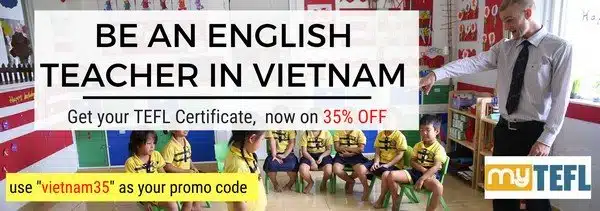Deciding to teach English abroad is a big decision. Even if you’re ready to commit to a year or more away from home, you still have to figure out what country to go to, what visa you’ll need for teaching, how much you’ll make, challenges you may face, and more.
If you’re thinking of teaching English in Vietnam, you’re not alone! Vietnam is one of the most popular countries for teaching English. This stems from its combination of low cost of living and relatively high wage for teachers, friendly locals, delicious foods, and plethora of things to do across the country.
In this guide, we’ll cover everything you need to know for entering Vietnam as an English teacher, in including job availability, requirements, visas, salaries, potential challenges, and more.
Demand for English Teachers in Vietnam
Vietnam is one of the countries with the highest demand for English teachers. The demand had already been rising for years before COVID messed everything up. But now that Vietnam is totally open again, the demand has already rebounded to pre-pandemic levels.
If you visit any expat Facebook group related to teaching jobs in Vietnam or simply Google “teaching jobs in Vietnam”, you will most likely be overwhelmed with unending posts about job offers. What you’ll probably have to do at this point is decide where in Vietnam you want to live in order to narrow your choices down.
Job Requirements – Who Can Teach in Vietnam?

Despite what you may have heard in the past, not just anybody can show up in Vietnam and become an English teacher – at least not anymore. The requirements have become stricter and the schools more professional as the years and decades have passed.
At the bare minimum, you legally need a degree to teach English in Vietnam. On top of that, there is a strong preference for native English speakers (and this can get a little messy – see the “ugly truths” section below).
You’ll also need a clean background check. Last but not least, more and more schools are now requiring some kind of TEFL certification – which you can easily do online.
You DON’T need to have any teaching experience. Also on the plus side, the general requirements for entering Vietnam have loosened significantly since COVID times.
Here’s a summary of the base requirements/qualifications for teaching English in Vietnam:
- Native English speaker – Usually this is determined based on what passport you have, with the main ones they usually recognize as “native” being USA, Canada, UK, Australia, New Zealand, and South Africa. More on this below.
- A university degree – This is a legal requirement to get officially hired in Vietnam. It doesn’t necessarily have to be an education or English-related degree – any 4-year Bachelor’s degree will do. Some schools, however, prefer to hire teachers with a degree specifically related to education or English. They will want to see the original degree, not a copy.
- TEFL/CELTA – Most (but not all) schools in Vietnam also want teachers to have taken a TEFL course or something similar, like CELTA. This is not a legal requirement, but most schools nowadays require it. You can easily get your TEFL certificate online. You can enjoy 35% off if you use vietnam35 as a coupon code – You can also get certified once you are in Vietnam.
- A valid passport and visa (more on visas below). The passport should be valid for at least 6 months from your anticipated starting date, though more than a year would be ideal so you don’t have to apply for a new one while you are there.
- Criminal background check – from your home country or country of residence in the last 3 years
- CV and related documents – The school may want a formal resume/CV plus any other relevant documents demonstrating your work experience or courses you’ve taken.
TIP: If you want a more professional teaching position, look for schools that will check not only your English credentials and physical appearance, but also who will require you to have experience in teaching, a teaching certificate, and/or a master’s degree. These schools are more serious in the business, which is also an indication of the quality of teaching they provide to their students.
Visa and Work Permit for Teaching

You won’t believe how many English teachers come here and work on a tourist visa. This is, in fact, illegal – if you plan to work here, you legally have to secure a business visa and a work permit. Working on a tourist visa or on illegal documents can result in serious trouble such as deportation and being banned permanently from the country.
If the school let you work on a tourist visa, this is a red flag and a sign of unprofessionalism. They are more likely to screw you over at some point, for example, by not giving you your last paycheck when you quit the job or simply firing you without any acceptable reason. They can also use this against you and you cannot ask for legal help regarding this matter.
If you get hired before you come
While landing a job before you arrive can have some downsides (you can’t see the school/meet the boss first, you don’t really know what you are getting into), the plus is that the school with help you navigate the visa process. What’s more, with only shorter (30 day only) visas now being given for travelers, it is now an even better option than before to get hired BEFORE coming to Vietnam.
If you land your job before coming, the school will help you apply for a 3-month business visa before you arrive. This will give them the time they need to apply for your work permit after you arrive.
You are allowed to work while you are on the business visa, but only under the condition that you work permit is being applied for. In other words, you can’t just get a business visa and then work indefinitely with that alone.
If you want to arrive first then find a job
If you prefer to show up in Vietnam first, this has the advantage that you can explore first, see the schools/meet the boss, and become more familiar with what’s what in Vietnam before signing a contract to teach.
However, with only 30-day visas now available for tourists, this is not enough time to arrive, get settled, find a job, and have your school process your business visa. Therefore, you’ll have to either or leave the country and re-enter to get another 30 days. Unfortunately, these 30-day tourist visas can’t currently be extended like they used to.
Another thing to know about this route is that you’ll want to bring enough cash to set up your life there before you land your job and get your first paycheck. Find out how much you’ll need in our budget for moving to Vietnam.
You can find more detailed information about all this in our guide to the different Vietnam visa types, how to apply for a Vietnam visa, how to apply for a Vietnam business visa, and applying for Vietnam visa as a US citizen.
GET YOUR TOURIST VISA NOW – IT TAKES ONLY A FEW HOURS
Ugly Truths or Potential Challenges
There are loads of private English centres and public schools that are desperate to get their hands on a foreign teacher. However, there are a few ugly truths about teaching in Vietnam that you need to know about:
- Native English speakers are strongly preferred. They generally determine whether you count as one according to your passport type (US, Canada, UK, NZ, OZ, South African preferred). However, they don’t consider that many people from other countries (such as Singapore, Philippines, Indian, and more also speak English from birth).
- Even if you are a native English speaker, your skin colour can affects your chances. Some schools and parents still hold the outdated idea that a “real” native English is White. Many expats and even locals have voiced their concern about how wrong this is. Sadly, changes regarding this discrimination still have a long way to go.
- Indeed it seems that some schools just want to hire White foreigners so they can have a White face to show to the parents and attract more customers.
- Non-native English speakers and non-Whites may have more difficulty finding a teaching job in Vietnam. If you belong to either category but are qualified, you should look into bigger companies and international schools. These tend to be more professional and are more interested in your experiences and qualifications. Having said that, I also know (for example), brown/black people from Western countries who still manage to get jobs in regular private schools.
- To say it more directly, racism in Vietnam in the field of ESL teaching is widespread. People of colour have a harder time getting an ESL job simply because of their skin colour or accent despite their years of experience in this field.
- The same applies for Viet Kieu, or Vietnamese born overseas. Despite the fact that they may be native English speakers (and possibly even speak Vietnamese too!), they will struggle to get hired and paid the same as White English teachers.
- You may encounter a slight preference among schools for female teachers, especially for younger aged students, because of the traditional belief that women are more nurturing, and because most local teachers or young children are women. Still, this won’t stop male teachers from finding a job.
If you are offered a lower pay rate simply because you are not Caucasian but you know that you are a qualified one, don’t accept or sign the contract. There are jobs and students who are willing to pay you fairly, and know your value. If all aspiring ESL teachers coming to Vietnam will fight this massive race issue by rejecting low paid jobs, at some point, hopefully, Vietnam will see everyone’s value equally.
What Is Teaching in Vietnam Like?

When deciding whether you want to become an English teacher in a country like Vietnam, it’s important to ask yourself questions like “Will I actually enjoy teaching?” and “Will I be a good teacher?”
If you aren’t good with kids, are super shy or awkward when speaking in public, don’t like being in the spotlight, aren’t good at following instructions, then this job may not be for you.
Working with young kids and watching then grow can be super rewarding, but it can also be quite tiring. 20 teaching hours per week might not sound like a lot, but it really is, especially when you factor in the preparation time and commuting time.
If you’re teaching in a private/cram school, the quality of the schools varies a lot. Some are quite professional, have strict guidelines, and provide training, outlines of what to teach, and lots of materials. Others are poorly run businesses with bosses just trying to cash on the fad. You may be given little guidance and just have to wing it on your own.
It’s important to keep in mind that, as businesses, these kinds of schools tend to care about one thing the most: keeping their customers. It might sometimes seem like maintaining a nice facade and appeasing the parents is more important than actually educating the kids.
Although less common, some foreign teachers get hired by public schools. These jobs tend to be pretty lax, without much preparation time, but you may sometimes feel like you are more of a babysitter than a teacher. These schools often have very large class sizes, too, so that’s something else to be aware of.
What is the Salary for Teachers?

While you won’t get paid as much for teaching English in Vietnam as you would in, say, the Middle East or Northeast Asia, you probably WILL make more than you would in nearby Thailand.
But more importantly, a typical teacher’s salary in Vietnam is quite attractive if you compare it to the super low cost of living. This section will give you a ballpark idea of what the salary of an English teacher in Vietnam is like.
Depending on your lifestyle, you can definitely save some serious money while teaching in Vietnam. See here to learn how to send money out of Vietnam!
Hourly Rate
The hourly pay rate in Vietnam ranges from $15-$25 per hour. You will see higher rates in the big cities, like Ho Chi Minh (Saigon) and Hanoi, while you can expect less in smaller cities or rural areas.
There are some schools that will hire you and start the pay at $18 with a chance of a raise depending on your performance. Always double check your contract before signing.
With these rates in mind, if you work around 15-20 teaching hours per week, which is pretty normal, you can expect to make around $1000-1500 per month teaching English in Vietnam. Put in a few more hours per week, though, and you can push that figure to $2000 or more.
Part-time vs Full-time
Some schools may hire you as a full-time teacher, which means you will be guaranteed to get around 20-25 hours per week for a whole year. However, sometimes, as the “full-time” teacher, you may be expected to stick around more or do extra things, and you’re kind of locked in for the year. Schools tend to prefer giving full-time roles to teachers with some experience.
As a part time teacher, you may get less hours, such as 12 or 15 per week. You may be happy with this, or you may want to find additional hours in other schools or tutoring to supplement your income. As a part-time teacher, you may even get full-time hours, but since you are not officially full-time, those hours are guaranteed to stay. In other words, being a part time teacher is more flexible.
Salaries for Non-native English Speaker or Non-White
Sadly, despite your experience, if you are a non-native English speaker, often you will be offered a lower salary ($10-$15/hour). Another painful reality is even if you are a native English speaker, if you are not Caucasian, there is a chance they will try to pay you lower.
In this situation, especially if you have the experience, you should work with well-known language centres or international schools that look past your physical appearance but rather value your skills and experience.
How to Find an ESL Job in Vietnam

Now that we’ve covered most of the aspects of teaching, how do you actually find a teaching job in Vietnam?
Facebook Groups
One of the most common ways to find teaching work in Vietnam is to join Facebook groups aimed and teachers and teaching jobs, such as this one or this one. There are several of them, and a constant stream of new job openings are posted every day.
It’s a good idea to browse for a while and do some research before opening dialogue with employers or committing to anything.
You can also upload your job posting, CV, contact details, and what you are looking for in these groups and ESL schools and centres will reach out to you. If you receive an offer but are in doubt about if it is legitimate or not, you can ask about it in the expat Facebook groups, of which there are also many.
Websites & Agents
You can also directly find reputable schools in Vietnam online and then apply directly to their sites, or use websites that list jobs for schools across the country. Examples are this one and this one.
We recommend you to be cautious here, as some job listing sites can be dodgy. Remember to never pay anything to anyone who promises to get you a job – this scheme is often a scam.
Teaching Online
Another way to earn money being an ESL teacher is to teach online. There are great benefits in doing this. For example, you can teach while travelling, you don’t need to hustle through the traffic and spend money on transportation, and you can teach comfortably at home.
You might even consider staying in Vietnam on a tourist visa, doing visa runs or extensions, and teaching kids online – the kids could be anywhere in the world. This is a huge business in China, and Vietnam is on the same time zone, so it would make sense time-wise.
Some examples of this are EF (China-focused) and Preply (international).
Other Questions about Teaching in Vietnam
Here are a few other questions you may have about coming to Vietnam to teach English.
Will I have to Do a Teaching Demo?
Some schools will ask you to do a demo lesson for around 30-minutes as a part of the onboarding process. Some demos are paid whilst others are not.
Remember to ask about this before agreeing to perform one. Be aware that some schools invite a lot of aspiring English teachers and require them all to do demos for free. Essentially they are using this as an excuse to get free teachers.
If you’re getting hired from abroad, there won’t be a demo requirement, but you may have to do an interview over the phone or video chat.
Are there Additional Perks or benefits?
Some schools in Vietnam offer additional perks like free accommodation or a transportation allowance, but this is not the norm. Similarly, it is very rare for them to pay for your flights, which you might see in some other countries.
However, some schools in Vietnam do offer a year-end bonus, because they strongly prefer that teachers finish the school year (for obvious reasons, including continuity for students), if not stay for several years. This bonus usually amounts to half or even a full month’s salary.
Another perk to teaching in Vietnam is that you get to experience Vietnam! Whether this be taking a holiday in tropical Phu Quoc island, exploring the country’s huge caves, riding a motorcycle on these famous routes, temple-hopping, hiking, cruising on Halong Bay, and/or feasting on delicious Vietnamese street food, by working in Vietnam, you get to broaden your horizons and get to know one of the world’s most unique and fascinating cultures.
What should I pack? Dress Code?

Once you have found a teaching job and signed a contract, there are a lot of things that you still need to prepare. One of them is to pack the right work clothes. Fortunately, we’ve prepared this packing checklist for moving to Vietnam!
The dress code for teaching in Vietnam is not a lot different than in other parts of the world. You are expected to dress at least semi-formal. Some more high-end schools may expect more formal attire, while some private schools may even be fine with shorts and more casual clothing.
You can of course buy more clothes in Vietnam, but you may find it tougher to find clothes you like, or clothes that fit if you are very tall or plus-size.
Depending on where you will be living and teaching, some schools have AC while others don’t. If you will be in the north, pack a good semi-formal jacket as it can be cold during winter, while in the south, make sure you pack light but comfortable clothes, as the south can be very hot and humid year-round
Some schools even have a casual day once per week. It is best to ask about your school’s policy if they haven’t already informed you.
Also see our more general guide to what to wear in Vietnam.
Female teachers
For women, here are some suggested outfits:
- a dress that is knee-length or longer with a short or longer sleeve, but stick with a standard neckline – showing lots of cleavage isn’t appropriate
- dress pants and a button-up shirt with sleeves
- a knee-length skirt or longer and button-up shirt with sleeves
- you can wear a sleeveless blouse but use a jacket cardigan
- black shoes, high heel shoes or flat shoes are all acceptable as long as they are closed
Male teachers
Here are some ideas on the dress code for men:
- dress pants and a button-up shirt with short or long sleeves
- dress pants and a polo shirt
- black shoes
- it is not expected to wear a tie unless specified by your school
- some schools may allow jeans and a T-shirt or possibly even shorts
Well, we hope we’ve answered all the questions you have about how to teach English in Vietnam. Teaching in Vietnam is a true opportunity, but better you research and plan your move, the higher your success rate will be. Learn more in our guide to moving to Vietnam!
Tips for Trip Success
Book Your Flight
Find an inexpensive flight by using Kayak, a favorite of ours because it regularly returns less expensive flight options from a variety of airlines.
Book Your Hotel or Special Accommodation
We are big fans of Booking.com. We like their review system and photos. If we want to see more reviews and additional booking options, we go to Expedia.
You Need Travel Insurance!
Good travel insurance means having total peace of mind. Travel insurance protects you when your medical insurance often will not and better than what you get from your credit card. It will provide comprehensive coverage should you need medical treatment or return to the United States, compensation for trip interruption, baggage loss, and other situations.Find the Perfect Insurance Plan for Your Trip


Anita Keskar
Thursday 23rd of February 2023
I am a 65 year old Indian lady with a Bachelor in Arts and Education from India and have about 36 years of teaching experience in India.Currently , I am in Hanoi with my husband who is working here.I would like to teach partime.My subject is English.What chances do I have.?
Chris
Thursday 2nd of June 2022
Hi Isabelle,
Thank you for the loads of info posted on your web site; it is quite helpful as I am moving to Vietnam shortly, as soon as bureaucracy permits. I accepted an offer from one of the big ESL training center chains to teach in a "small" city near HCMC. I hold a German passport, a Business BA from the USA, a Celta and 2 and a half year experience teaching ESL in a Hong Kong.
Just for your information ESL centers seem to be a bit desperarate due to the scarcity of teachers in Vietnam now. I interviewed with three of the ESL chains and they seem to hire anybody close enough to the usual requirements (even a NNES German! :).
Thanks once again for your web site! Chris
Isabelle
Friday 3rd of June 2022
Hi Chris,
Yes, there's a big shortage of English teachers now since the requirements for work permits have changed. Which is actually kind of good. Finally, NNES teachers who are qualified, experienced, and passionate about teaching can negotiate fair wages, especially POC.
Congrats on the new job! Many newcomers often start in a small city outside the big city. Once your contract is up, you can see if you want to make the move to a different place or a bigger city.
Hope you can come soon!
Matt
Thursday 26th of May 2022
Disappointing that they now require not just a degree but a degree in teaching in addition to a TEFL/TESOL qualification. Been looking for a new direction after getting the all clear from my doctors after a long term health problem and wanted to get a TEFL qualification to come to Vietnam and teach & travel but that's not going to be happening now. Should have done it years ago when I originally wanted to before I got sick. Back to the drawing board I guess. Thanks for providing all of the up to date info on this page.
Isabelle
Saturday 28th of May 2022
Hi Matt,
Sorry to hear that. It's been quite a change. There's a shortage of English teachers here. If you have taught English before, the experience you have might be able to override the degree requirement. Depending on where you are from, you can also get a teaching license. I know that if you have a degree, let's say Chemistry, you can go and take a test to get a teaching license. But before you do that, you should check with a possible employer here first to ensure that can get around the new policies.
I hope this helps.
Isabelle
Teacher Sayr
Tuesday 1st of February 2022
Hi, I am a Filipino online ESL teacher for more than two years now. Last year, I started handling and teaching Vietnamese students online (adult and children). I have a four-year degree course not related to teaching, but I have a TEFL certificate issued just last year. I am considering the idea of teaching in Vietnam, but I just don't know where to start. 😁
Isabelle
Thursday 3rd of February 2022
Hello Sayr,
The government recently changed the rules (during COVID) for English teachers to either have a teaching degree, an English degree, or 5+ years of teaching experience to qualify for a work permit as an English teacher. However, this is very new, I think it's still worth a shot to apply to English centres and schools in Vietnam. They will know the best way how to hire you.
Also, before COVID many foreign English teachers are simply getting a business visa and then starts teaching. I'm not sure if this will still be an option once the international borders are fully open.
I hope this helps.
- Isabelle
Bona
Tuesday 28th of December 2021
Hi Isabelle, I'm a teacher who holds bachelor's degree in education with 6 years of teaching experience. I'm a Ghanaian. Can I get a teaching job in Vietnam?
Step
Tuesday 18th of January 2022
Hi Isabelle,
I'm Asian and a bachelor's degree holder but not related to education; however, I have a TESOL and TEFL certificate, and currently an ESL teacher in another southeast Asian country. Do you think it is enough to land a good ESL job in Vietnam?
Your response will be highly appreciated. Thank you.
Isabelle
Tuesday 28th of December 2021
Hi Bona, the best way to look for English teaching jobs is to apply to English centres especially if you have the right education and working experience. You can also join Facebook groups where people are posting job opportunities - https://movetovietnam.com/most-active-facebook-groups-for-expats-in-vietnam/
I hope this helps.
Isabelle